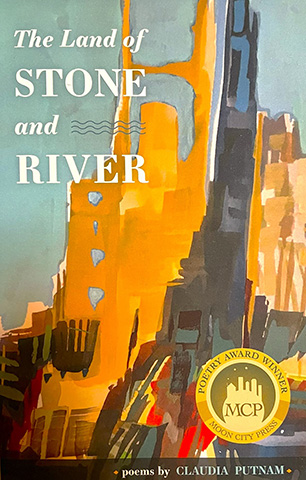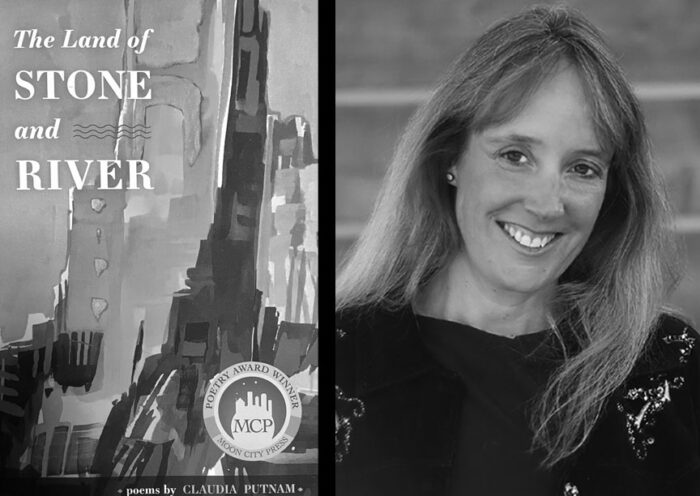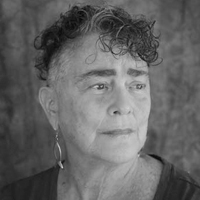The Land of Stone and River, poems by Claudia Putnam
Moon City Press, 2022
Winner of the Moon City Poetry Award
96 pages; $14.95
ISBN: 978-0-913785-63-8
Cover Art by Nancy Martin: New Land IV, watercolor.
Reviewed by Risa Denenberg

Claudia Putnam starts her poetry collection, The Land of Stone and River, with an elegy and a prediction. In the three-lined first poem, “Hoard,” she notes a mound of “pennies / packrat-piled beneath the shed,” and declares this is a “Sure sign of the end.” In the second poem, “Elegy for Snow,” a speaker from a future time (maybe closer than we think) tells someone the story of “In the time when winter was winter—.” She continues her poignant narration with,
You know nothing of quilts, either.
Nor can you know of that quiet,
related somehow to cold
and to particular greens of evergreens,
particularly to chickadees
who used to perch there, rotund
with secrets of winter.
Although these two poems are the book’s starting point, the remainder of the poems are bookmarked by them—musings on past things lost and fearful things to come, enveloped within the natural world that is both stunning and terrifying.
There is a set of twenty paintings by Bhavani Krishnan titled, Twenty Mountains and I am guessing this is the reference for the title of first section of poems in the book. In that sense, some of these poems are ekphrastic, or perhaps a more apt term would be meditative. The paintings are mostly muted shades of blue, grey, and sand. And yet there is a touch of pink or yellow in a few of them. In style, they resemble the book’s cover art. In only one of the twenty do we see two distant figures, walking along a path. Similarly, in The Land of Stone and River, people populate the poems like ghosts. Many are ghosts.
In “This Isn’t Really Happening,” Putnam writes, “Each year / the river runs thinner, / fleeing its shrinking glacier.” Warnings of catastrophes abound throughout the book. In this section, the totem animal is a crow, though the warning is for all of us:
Poor lost crow, these are not
the best of times
to be falling asleep.
It is the sixth poem in the book in which we learn of the death of a child called Isaac, “who sprang / fully formed into our lives / and died. In “Unawake,” a commingled homonym, Putnam’s words poignantly and disjointedly display how such a death—an infant—weighs so heavily on the child’s parents yet receives so little support from the rest of the human world.
[…] if it is odd to have a dead kid without a funeral believe it or not that is one thing in America with family thousands of miles away that can fall through the cracks camel a mother’s back and there is no heaven.
The feeling that life was muted in that moment is overpowering. Some time later, healing alone with a broken ankle, Putnam’s thoughts turn to others’ loneliness:
We turn dead eyes
to so many lying solitary. No break
really heals. We try to go on
with our plans.
It always interests me when a poet pays homage to other poets in their work. In this work, Putnam nods to Jane Kenyon, Octavio Paz, Carolyn Forché, Robert Bly, and artist Jayne Wodening, as if to seek their comfort in her grief.
Interesting too, since a crow reappears throughout the book, is her riff on Wallace Steven’s “13 Ways of Looking at a Blackbird,” which is titled, “Ways of the Lion,” referring to the mountain lions of American—cougars, lynxes, and bobcats. Her lynx is not a totem, but an animal to be feared when hiking in its territory. The last two stanzas read:
12.
It doesn’t care if you’re an environmentalist.
13.
For a while she carried mice,
but she didn’t feel
any safer.
Putnam may or may not call herself an environmentalist, but she has a righteous respect for what the environment consists of: plants, animals, and landforms.
The second section of poems owns the book’s title, The Land of Stone and River, where Putnam’s reverence for these elements runs deep. A multipart poem titled, “As the Wind Comes Among Us,” establishes the project of this book—to move forwards and backwards through origins and extinctions with the widest possible lens, seeking an elusive peace.
In the land of stone and river, godless
known by wind, that is, the continent
we name Gondwana, near the place we call
Equator, the range we term Ancestral
Rockies rises,
groundwater seeping beneath its flanks mixing—
in this memory—minerals to
iron oxide, turning in Time
to hematite—desire, surely—
rosy on the range we christen
bloody in our Time, still the Time
of the Conquistadores, and
it is dizzying.
Dizzying indeed. Were we all to study the history of earth so deeply, would we find peace? Of course not, though we would be wiser for doing so. But we must move on if we are to keep up with Putnam. So much so far is ballast for what’s to come in the last section of the book, Nervestorm. There is a warning—a quote from Oliver Sachs—in the epigraph of this section:
Migraine and neighboring disorders [epilepsy, manic depression] … are distinct and individual, but nevertheless have borderlands in which they merge into one another.
I’ve read a good bit of Sachs over the years, and I know the connection between migraine and epilepsy, but manic depression? Still, here it makes sense. In a series of poems titled, “Migraine,” “Limbic,” and “Nervestorm,” we find the protagonist weathering a St Elmo’s Fire storm; we travel through the limbic system; and we witness an “[Inner?] child writhing / hands on head / neck turning head snapping […]”. Such unpacking of the electrical system that is the human brain is rare.
This final section also unpacks suicide, conveying how knowledge and insight do not prevent—and probably instill—a deep desire to die. In “Suicide Note,” “the gun whispers from its safe / I am / here for you.” And in “The Battle of Brintellix,” Putnam asserts,
Nothing is more noisome than knowledgeable people
believing themselves to be best at guiding in grief.
Over that awful summer I ordered suicide
instructions from the internet,
favoring bags filled with floaty helium,
though I also thought then, of guns
In “Backcountry,” Putnam speaks to a dead friend,
Your son is dead now, suicided. Exit
bag drawn over his head.
In life / this would have destroyed you.
Speaking later in this poem, she says what is most true about herself: “You were a poet, sensitive, visionary. / You and I, so proud of our poetic // instability. We thought the world so sick.”
If you want to experience the awe I felt while reading The Land of Stones and River, you will have to study this book. You will have to google many unfamiliar terms. It is not an easy book to read and will not bring you peace. That is why you should read it.
Order book here –
UAPress
Claudia Putnam lives in western Colorado with her dog, Birdie. The Land of Stone and River, which won the Moon City Press poetry prize, is her debut collection. A short memoir, Double Negative, also published in 2022, won the Split/Lip Press CNF prize. She has also published a poetry chapbook, Wild Thing in Our Known World (Finishing Line Press, 2013); and a novella, Seconds (Neutral Zones Press, 2022). Her poetry and fiction can be found in dozens of literary magazines including Rattle, Spillway, RHINO, Barrow Street, The Fourth River, and Iron Horse. She’s been the recipient of a George Bennett fellowship at Phillips Exeter Academy and a Ragdale Foundation residency, and has taught in the Writing Program at CU-Boulder.
BIO
Risa Denenberg lives on the Olympic peninsula in Washington state where she works as a nurse practitioner. She is a co-founder of Headmistress Press; curator at The Poetry Café Online; and Reviews Editor at River Mouth Review. Her most recent publications include the poetry collection, slight faith (MoonPath Press, 2018) and the chapbook, Posthuman, finalist in the Floating Bridge 2020 chapbook competition. A new collection, Rain Dweller is forthcoming from MoonPath Press in 2023.















